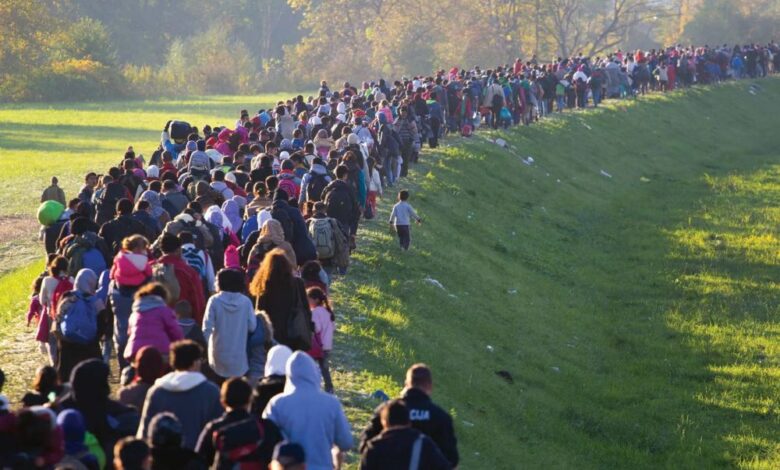Migration supports robust resilient communities

THE TIMES KUWAIT REPORT
Migration has been part of human history ever since the evolution of mankind. Early people migrated from one place to another in search of better food and safer shelter from predators and natural calamities. Although today international and domestic migrations are largely driven by economic considerations, or to escape natural crises or man-made conflicts, at its core, global migration continues to be guided by the basic human instinct to better one’s life and that of their families.
In the 2024-edition of its flagship biennial publication, ‘World Migration Report’, the International Organization for Migration (IOM), notes that today more than 281 million people live in a country other than their place of birth. To put this figure in perspective, the number of global migrants is more than the entire population of Indonesia — the fourth most populated country in the world.
In recent years the slew of Insinuations, imputations, and accusations against migrants in the media has led to migrants being perceived in a negative light by many in the host country. Discussions in social and political circles on migrants and migration, often center on how migrants are a drain on national resources and a threat to internal security. Their presence and practices are seen as infringements on traditional cultures, social mores, and religious values of the host nation.
Migrants are also often blamed for rising criminal activity in society. While it is true that many migrants may follow different faiths or display cultural practices that are at variance from the larger host population, the accusation that migrants are responsible for an increase in law-breaking activities is unfounded. Numerous studies and security records show that migrants are no different than local citizens in this regard.
Migrant remittance volumes are also a source of contention with critics of migration often calling for curbing or taxing foreign remittances. However, proponents point to the multiple benefits that accrue from remittances to both the host country and the recipient nation. Globally, remittance flows are estimated to have reached USD 860 billion in 2023, marking a 3 percent increase from a year earlier.
On average, nearly 7 percent of the annual global remittance amount goes to individuals and entities in host countries as transfer fees, in addition to providing employment to locals and boosting the economy. Also, the estimated $860 billion remittance in 2023 is likely on the lower side, as it does not account for unofficial transfers. According to the World Bank, global remittances through official channels to Low- and Middle-Income Countries (LMIC) touched $669 billion in 2023.
Migrant remittances also constitute a significant portion of the GDP of many developing countries, and in some places these transfers now surpass official development assistance (ODA) and foreign direct investment (FDI) flows. In 2023, the top five recipient countries for remittance inflows among LMICs were India (125 billion), Mexico (67 billion), China (50 billion), the Philippines (40 billion), and Egypt (24 billion). India has been the largest recipient of remittances since 2008
Negative perceptions aside, international migration remains one of the main drivers of human development and economic growth worldwide. Most migrants arriving in a new country contribute to the local economy and help build robust, resilient, and productive communities through their input of knowledge, networks, and skills, as well as contributions to social welfare.
Global studies on migration by the World Bank and other entities highlight the net positive impact of migration on the world economy— in 2023 migrants are estimated to have contributed nearly 10 percent of the global GDP. On a more microeconomic level, a 2021 survey by the Boston Consulting Group of senior executives across several countries and industries, found 72 percent of the executives considered migration to benefit their companies and countries.
In Kuwait, despite policies that seek to replace expatriate workers with citizens in the labor market, and amid calls to realign the demographic imbalance, the country’s economy continues to rely heavily on its migrant workforce. This dependence was driven home during the COVID-19 pandemic when a significant number of migrant workers left the country. The lack of foreign workers in the labor market severely impacted Kuwait’s post-pandemic economic recovery efforts.
Although nearly two-third of the country’s population are foreigners, and empirical evidence points to their indispensability to the economy, Kuwait is yet to address some of the challenges faced by migrants, or seize the opportunities presented by the vast number of migrants in the country. It is true that in recent years Kuwait has initiated a series of laws and policies aimed at protecting the rights of migrant workers.
For instance, Private Sector Labor Law 6 of 2010 and its amendments now govern employer-employee relations in the private sector. In 2015, Kuwait also enacted Law No 68 and Ministerial Decision No 2194 of 2016 to protect the rights of domestic workers in Kuwait. Until then, the more than 700,000 domestic workers in the country had no legal framework to protect their labor rights.
In 2017, Kuwait joined IOM as an observer state, and the IOM office in Kuwait, which was established in 1991, has worked in close partnership with Kuwait to strengthen the capacity of relevant national counterparts and ministries tasked with the protection of migrants and victims of trafficking. In 2018, Kuwait also adopted the Global Compact for Migration(GCM), indicating its commitment towards achieving safe, orderly and regular migration.
Implementation of the non-binding GCM helps states to improve the governance of migration, to address the challenges to human mobility without compromising their sovereignty, or the human rights of people, and to strengthen the contribution of migrants and migration to sustainable development in a way that increases benefits for individuals, communities and countries, and reduces its risks for all.
However, implementation of the GCM in its entirety, in both letter and spirit, has been challenging for Kuwait. For its part, the IOM organizes awareness campaigns on the topic of human trafficking and the rights of domestic workers. IOM also continues to share technical expertise with government and civil society organizations on migrant protection, and protection to potential victims of trafficking, as well as on implementation of the GCM..
By 2017, Kuwait had ratified nearly a dozen international human rights instruments and labor conventions, including on forced labor, minimum age for work, and the ILO Domestic Workers Convention. Despite the signing of multiple international covenants and treaties, as with the GCM, it is in the adoption of these international principles within the Kuwaiti national legal system, and in its implementation at the grass-root level that Kuwait has struggled.
As the UN entity for migration, the IOM has an obligation to demystify the complexity and diversity of human mobility. Misinformation and politicization of migrants and issues related to migration have often strayed far from a balanced and accurate depiction of migration. It is against this background of migrant bashing that the ‘World Migration Report – 2024’ gains added salience.
The report presents a clear and accurate picture of the changes occurring in migration and mobility globally, so that policy- and decision-makers, as well as civil society organizations and individuals can better understand and adapt to the changes. Speaking at the launch of the report, IOM Director General Amy Pope stated: “In a world grappling with uncertainty, understanding migration dynamics is essential for informed decision-making and effective policy responses… We hope the report inspires collaborative efforts to harness the potential of migration as a driver for human development and global prosperity,”












